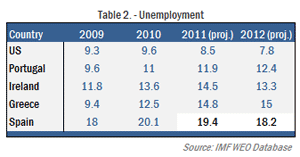Did Strauss-Kahn really make the IMF more progressive?
- May 15, 2011
Capitalism & Crisis
The IMF talking about ‘inclusive growth’ is like the Gaddafi regime organizing a conference on human rights.
- Author
Today, IMF boss Dominique Strauss-Kahn was meant to meet with German Chancellor Angela Merkel to discuss the potentially disastrous escalation of the eurozone debt crisis amidst fears of a looming Greek default. But DSK didn’t show up for the meeting. Instead, he spent the day in a New York prison on charges of the attempted rape of a hotel maid.
Obviously, Strauss-Kahn remains innocent until proven guilty, but that doesn’t stop the obituaries from pouring in already. The New York Times warns that DSK’s arrest might contribute to a victory for France’s far-right in next year’s presidential elections, while Le Monde and Libération both highlight the embarrassment to the IMF, the Parti Socialiste and the French political establishment in general.
Yet the alleged rapist still has his admirers — although they come from strange and unexpected places. Wondering who might succeed DSK, Larry Elliot, the normally very astute economics editor of the Guardian, just praised Strauss-Kahn for reforming the IMF and making the organization more progressive.
According to Elliot, DSK “identified the crucial falings of the Washington-based organisation and set about rectifying them … he highlighted the need to focus on employment and accepted that countries facing speculative pressures were justified in using capital controls to defend themselves … The fund’s coffers were also replenished.”
To be fair, Elliot isn’t the only one praising the leadership of the flamboyant Frenchman. Less than two weeks ago, the Nobel Prize-winning economist and lifelong IMF critic, Joseph Stiglitz, called Strauss-Kahn a “sagacious leader of the IMF,” crediting him with “the Fund’s effort to distance itself from its own long-standing tenets on capital controls and labor-market flexibility.”
What is going on here? Have the giants of the center Left become so used to an extremely dogmatic, market fundamentalist IMF that they have come to embrace the Fund’s toned-down hardball politics on Greece and Ireland as soft play? Apparently some cunning window-dressing and empty rhetoric is enough to mislead even the brightest minds in academia and the mainstream media. Whatever happened to a critical assessment of the facts?
For all his talk about employment and inclusive growth, Strauss-Kahn didn’t seem to care much about these issues last year, when the IMF “issued blunt warnings to Spain,” whose unemployment rate, at 20 percent, is roughly twice the EU average and one of the highest in the developed world. In fact, Strauss-Kahn’s henchmen called “on Madrid to implement harsh cuts and transform the country’s labour market and pensions system.”
Or what about Greece, Ireland and Portugal, the three ‘peripheral’ economies where the IMF was called in by the European Union to use its expertise in fiscal sodomy for the benefit of the financial sector? All of the so-called ‘PIGS’, who are being urged (if not ordered) by the IMF to pursue draconian budget cuts, have experienced depressed growth and runaway unemployment rates. Indeed, for IMF clients, the Fund’s chimerical ‘inclusive growth’ agenda actually appears to mean negative growth.
Granted, the IMF has been more flexible in its dealings with Greece than the deficit hawks at the European Central Bank. But given the ECB’s reputation as a citadel of neoliberalism, this is hardly a feat to take pride in.

As a matter of fact, the IMF never became more progressive under Strauss-Kahn’s leadership. While its policies remained just as staunchly antisocial, the discourse surrounding the Fund’s fiscal fetishism took on Orwellian proportions. For example, while the IMF has rhetorically embraced capital controls as a legitimate policy tool against crippling financial speculation, it was very quick to tell Chile not to use them.
Also, when Wael Ghonim (wiki), Egypt’s celebrated Google revolutionary, confronted Strauss-Kahn during a public debate last month, the IMF boss found himself forced to admit that, even under his leadership, the IMF made highly questionable loans to the region’s dictators that often failed to benefit — if not directly disadvantaged — the people. Once more, DSK blithely stated that recent events in the region had only reaffirmed the Fund’s commitment to ‘inclusive growth’ in the future.
But in a witty and highly pointed rebuttal, the moderator of the debate — Al Jazeera‘s Abderrahim Foukara — compared this IMF doublespeak on inclusive growth to the Gaddafi regime organizing a conference on human rights. Indeed, Strauss-Kahn may not be a Colonel Gaddafi himself, but he certainly played the role of a Said; an outwardly friendly and charismatic leader nominally committed to progressive reform, but in the meantime a staunch loyalist to the fundamentally undemocratic core project of the regime.
But endless moralizing won’t get us anywhere. The real problem, of course, is structural. Dominique Strauss-Kahn, the flamboyant technocrat, is nothing but the personification of our ‘post-ideological’ era. His missteps and treachery only serve as a reminder that in today’s world, financial capital reigns supreme and unelected policymakers consider themselves elevated above the petty nuisance of democratic governance.
In this ‘golden straitjacket‘ of neoliberal globalization, political debate has been relegated to the fringes of an ever-shrinking public sphere, and a multi-millionaire caviar Leftist can drive around in Porsches, fly around the world to serve the bankers and extort hard-working people, and still be nominated for the Presidency on a ‘socialist’ ticket.
Unless, of course, you accidentally end up raping a woman in between. That part, at least, is still considered illegal.
Source URL — https://roarmag.org/essays/dsk-strauss-kahn-imf-arrested-rape-elliot-progressive/

